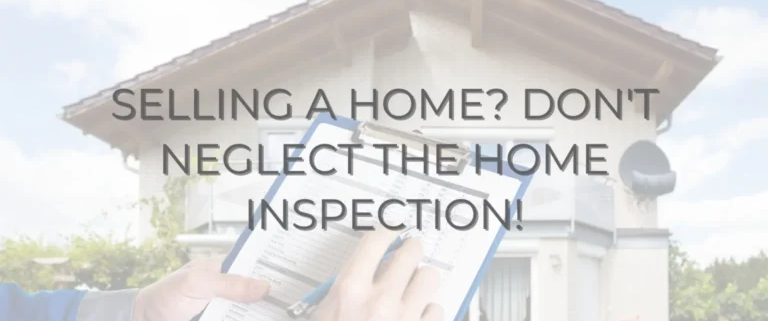Selling a home? Don’t neglect the home inspection!
Home inspections are not just something that homebuyers need to do before they commit to the purchase of a new home. They can be just as important when you are selling your own home, as well. Here’s why you should think about getting one done if you’re in the market to sell your own house, and how you can go about finding the right inspector who can help you out with all of this.
Why A Home Inspection is Important
When you sell your home, there are certain things that buyers will want to do before they sign on the dotted line. One of those things is hiring an independent real estate inspector to inspect your property, inside and out.
You might think that an inspection would uncover problems you already know about—but think again. Real estate agents and appraisers have been known to find problems that even home owners didn’t know existed.
So if you’re thinking about selling your house soon, make sure to read up on inspections—and how they can help—before you put it on the market.
How To Prepare For The Inspection
Real estate agents always tell sellers to make sure their houses are in tip-top shape before putting it on the market. One of your biggest concerns should be doing everything you can to set yourself up for success in what is undoubtedly going to be an expensive undertaking.
You want to make sure that any potential issues are as easy as possible for you and your agent to remedy. How else will you keep buyers interested, convince them that they’re making a good investment, and give yourself that crucial edge over your competition?
That’s where having things in order before you get started comes into play.
When To Do The Inspection
Inspections are not required in all states, but they are highly recommended. Hire an inspector to do a thorough walkthrough of your property as soon as you know you’re ready to sell. If possible, do it before you list. Why? A recent study found that homes without inspections take an average of 17 days longer to sell and cost their owners an extra $5,000 on average.
The real estate agent will be able to negotiate any issues into your contract with a buyer in advance—before they have time to put up any bids against yours. This way you can avoid getting lost in contingent upon clauses and last-minute haggling over stuff that should have been nailed down long ago.
Hiring A Good Inspector
Your real estate agent will likely be able to recommend inspectors, but not all are created equal.
Talk to friends and neighbors about their experiences with local inspectors and make sure you’re working with one who is: Licensed: Real estate agents should verify that your inspector has an active license. Inspectors who don’t follow proper protocol can jeopardize your sale as well as property values in your neighborhood.
Not An Advocate: A good inspector will give you a realistic assessment of what needs to be done on your property.
Here’s What to Look For During The Inspection
It’s common for home inspectors to identify several problems during their walkthrough. Many of them can be fixed quickly, and these issues generally don’t have much impact on whether a buyer will purchase your house.
However, you should give serious consideration to any problems that could seriously impact your property’s value or ability to attract buyers.
For example, if there is evidence of foundation problems or termite damage, you should consult with an expert immediately about fixing these issues before putting your house on the market.
The Results Are In…What Now?
A real estate home inspector will typically return a comprehensive report to you, detailing every single aspect of your house that requires attention. This may seem intimidating at first, but it doesn’t have to be—the results are organized in an easy-to-read fashion.
The report typically includes what repairs are recommended and when they should be done; however, there are many details that buyers need to know before they even set foot on their next property.
For example, you’ll need to know if your roof is in good shape (not just it looks fine) and if any structural issues should be taken into consideration before making an offer on a house.
I Found Problems – Now What?!?
What happens after you find problems with your home’s structure or systems during an inspection will depend on what kind of property you’re buying and who you work with.
If you hire your own inspector, then he or she will likely write up a report detailing any major issues, as well as offering advice on how to fix them. If you have a real estate agent or inspector handle your sale, it’s up to that person to communicate any problems to both parties.
The seller is ultimately responsible for repairing any defects—but most sellers and buyers expect something in return: compensation from the other party. At minimum, be sure there are clauses in your offer specifying whether repairs must be made before closing and what happens if they aren’t completed.
Seller Disclosures
The seller is responsible for informing potential buyers about any problems or defects with a house, as well as disclosing issues that could impact whether or not prospective buyers can get financing. This means, you’ll have to share documentation about everything from physical damages to liens and legal claims.
If your seller disclosure statement is anything less than 100% thorough, you could find yourself in trouble down the road. That’s why it’s important to work with a real estate professional who knows how to prepare detailed disclosures for homes being sold.
Typically, these will be provided at least 24 hours before an offer is accepted on your home—giving you plenty of time to negotiate repairs with your buyer if need be.
Need more answers?
Get in touch and let’s connect today! I can be your real estate guide from start to finish.





